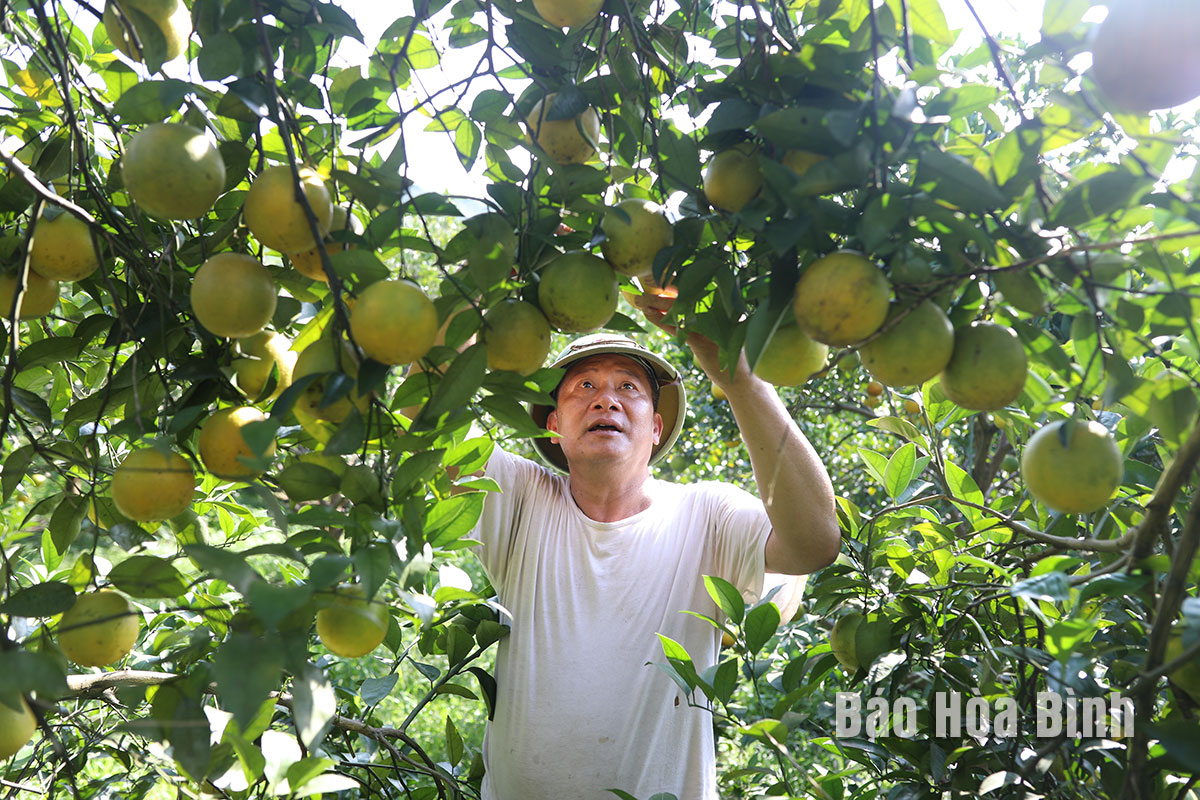
Orange growers in Cao Phong district of Hoa Binh province have enjoyed a good harvest and good prices of the fruit this year.
Photo: Phan Van Tam, a farmer in Cao Phong town of Cao Phong
district in his orange orchard.
Phan Van Tam, a farmer in Cam Phong town of Cao Phong district said that he
started growing orange when he retired in 2017. This year, he harvests about 15 tonnes of orange from his 4,000 sq.m orchard.
Each kilo is sold at 18,000 VND to 20,000 VND (0.7-0.8 USD).
Tam said that he can earn about 300 million VND, with a net
profit around 200 million VND. This year, he and many other local orange
growers are very optimistic because of a good harvest and good prices.
Bui Van Dan, head of the district’s Division of Agriculture and Rural
Development, said that in the 2024-2025 season, the district has more
than 971 ha of citrus trees, including 715.21 ha of oranges with a projected
yield of 302 quintals per ha and an estimated output of 20,348 tonnes; 9.62 ha
of tangerines with a projected yield of 202 quintals per ha and an estimated
output of 194.32 tonnes; 27.9 ha of lemons with a projected yield of 44.6
quintals per ha and an estimated output of 70.9 tonnes; and 218.82 ha of grapefruits
with a projected yield of 169 quintals per ha and an estimated output of 3,698
tonnes.
With the potential for citrus trees farming, particularly
oranges, Cao Phong district has implemented various strategies to support local
farmers.
Orange farming has proven to be a significant economic driver for Cao Phong
district. Cao Phong orange was the first agricultural product in Hoa Binh
province to be officially recognised and protected under a legal framework for
geographical indications in 2014.
In 2016, the International Intellectual Property Institute
awarded Cao Phong orange the title of one of the "Top 10 Famous
Brands." This recognition highlighted the brand's quality and reputation
in the marketplace, reinforcing its status as a notable agricultural product.
Cao Phong oranges are now available in major supermarkets nationwide like Big
C, Winmart, Metro, and BRG.
The district's orange output in several recent years has
exceeded 30,000 tonnes yearly, and each hectare of orange can generate 500 - 700
million VND. Many households have got rich thanks to orange farming.
The district is actively working to preserve and promote the Cao Phong orange
brand. As part of the project to rejuvenate citrus trees in the district for
the 2021-2025 period, with a vision towards 2030, the district has focused on
replanting orange trees and maintaining high-quality, VietGAP-certified
orchards. Models that combine orange cultivation with tourism have been
developed. The district has also paid more attention to applying scientific
techniques in processing, and diversifying orange products.
The district also boost communications to engage people in
preserving the Cao Phong orange brand.
Since the beginning of this year, under the direction of the Department of Agriculture and Environment, the Sub-Department of Agricultural, Forestry, and Fishery Product Quality Management has strengthened the integration of the professional activities to promote and guide the organizations and individuals in the production and trading of agricultural, forestry, and fishery products to comply with the legal regulations regarding the use of chemicals, pesticides and veterinary medicines in crop cultivation, livestock farming and aquaculture. They also provide guidance to processing and manufacturing establishments on keeping the records to trace the product origins and using food additives from the approved list according to the regulations.
Hoa Binh province saw a significant rise in state budget revenue in the first two months of 2025, heard a meeting chaired by Vice Chairman of the provincial People’s Committee Quach Tat Liem.
Ha Thi Ha Chi, a 26-year-old graduate in law, has taken an unconventional path by returning to her hometown in Mai Chau district to establish the Tong Dau Cooperative, creating stable jobs for local women and bringing Thai ethnic brocade weaving to the global market.
As the Lunar New Year 2025 approached, pork prices surged, creating a profitable season for farmers in Tan Vinh commune, Luong Son district. Taking advantage of the rising demand, Can Minh Son, a farmer from Coi hamlet, sold over 30 pigs at 69,000 VND/kg, each weighing more than 100 kg. After deducting expenses, his family earned a profit of over 50 million VND.
alternate member of the Central Party Committee, Secretary of the Hoa Binh provincial Party Committee Nguyen Phi Long on March 5 had a working session with Yan Jiehe, Founder and Chairman of the China Pacific Construction Group, one of China's largest private corporations in the field of transport infrastructure. Deputy Secretary of the provincial Party Committee, Chairman of the provincial People's Committee Bui Duc Hinh and leaders of provincial departments and sectors also attended the working session.
The electronic printed circuit board (PCB) manufacturing and processing plant of Japan’s Meiko Group, located at Da River Left Bank Industrial Park in Hoa Binh city with a total investment of over 200 million USD, is expected to create thousands of jobs and make a significant contribution to the local budget.



